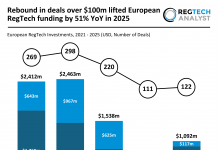The rapid growth of real-time and cross-border payments has transformed how money moves globally, creating both vast opportunities and new risks for financial institutions. In 2022, the Federal Reserve warned that the benefits of instant payments were becoming critical for competitiveness.
Today, the volume has reached nearly $500bn in real-time payments every day, much of it across borders. For banks and FinTechs, this represents a lucrative revenue stream but also a greater exposure to illicit activity such as money laundering and the financing of crime, claims Workfusion.
Cross-border transactions carry a heavier compliance burden than domestic ones, and they generate significantly more alerts. The Federal Reserve has stressed that compliance with anti-money laundering (AML) and counter-terrorism rules remains one of the most persistent challenges in international payments. Data quality is another hurdle. According to SWIFT, misspelt names and incomplete information can trigger costly investigations, delays in shipments, and knock-on effects for businesses reliant on timely payments.
Despite these challenges, the ability to settle transactions within seconds rather than days has become essential to the global economy. The key question now is how financial institutions can keep pace with regulatory obligations, particularly around sanctions, while ensuring seamless customer experiences in real-time.
WorkFusion’s AI Agent Tara has emerged as a solution to this dilemma. Tara automates real-time transaction screening to help banks manage sanctions compliance and AML tasks at speed and scale. The AI system is capable of handling up to 70% of false-positive alerts, cutting back on the manual workload for compliance teams. Crown Agents Bank, a UK-based financial institution focused on foreign exchange and cross-border transactions, recently adopted Tara to improve its compliance processes.
Crown Agents Bank SVP and head of AFC operations Shyam Kakad said, “Because our business is growing rapidly and our payment alert volumes are increasing, we needed a solution that could help us scale exponentially without added costs. By integrating WorkFusion’s AI Agent, Tara, into our transaction screening processes, we are reducing the false positive burden on our team, streamlining operations, and enhancing the speed and accuracy of payment processing. This is another example of our dedication to leveraging technology and AI to better serve our clients and navigate the complexities of global financial compliance.”
The bank is taking a phased approach to adoption. Currently, Tara is set to auto-adjudicate around 30% of false positives, with the aim of reaching 60% in the near future. The software offers multiple configuration options, allowing institutions to adjust how much AI is used in the process. This flexibility helps banks with varying levels of risk appetite to adopt the technology at a pace they are comfortable with.
For Crown Agents Bank, Tara’s benefits include a 30% reduction in manual effort for analysts, faster real-time reviews of sanctions alerts, and consistent quality of decision-making with clear audit trails. These capabilities align closely with regulatory guidance, such as OFAC’s recommendations, which highlight the value of scalable and accessible technology solutions in mitigating sanctions risk in instant payments.
As the demand for RTP and cross-border payments continues to rise, AI-driven compliance automation looks set to play an increasingly important role in balancing efficiency with regulatory expectations. Crown Agents Bank’s deployment of Tara is an early example of how financial institutions can leverage AI to strengthen both resilience and customer service in this high-stakes space.
Copyright © 2025 RegTech Analyst
Copyright © 2018 RegTech Analyst






